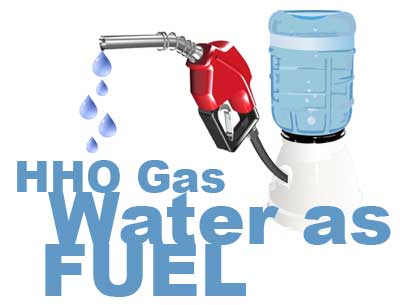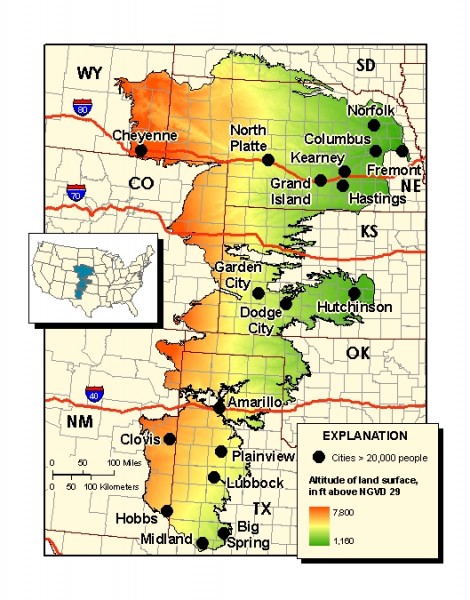I got up pretty early, at least early for me, this morning and have been listening to NPR as I’ve been trying to wake up. I just heard a segment about the Ogallala Aquifer and how it is going to be irreversibly drained in the next 50 years if we don’t slow down pulling water out of it at the rates we are.
The Ogallala Aquifer supplies 30% of the ground water used for irrigation in the United States. But the tap isn’t going to run forever.
And one of the main reasons that we are using some much water is to grow corn in Western Kansas to use to make ethanol. I guess the federal government mandates ethanol in our gasoline, probably to support corn prices, but whatever the reason, we grow it where we don’t have enough rain.
So, instead of growing wheat, which doesn’t need 14 inches of water per season to grow like corn, our farmers are planting corn and using lots of water.
This whole thing is very short-sighted. It reminds me of the draining of Lake Travis, outside Austin, to sell water to rice farmers downstream. Growing rice in drought stricken Texas is just stupid. I remember reading that the city of Wichita Falls, Texas, is going to start using toilet water to drink. Here is a link to that.
But, the Ogallala Aquifer is a lot more important than one lake in Texas. It supplies water to pretty much the whole central US. Water for crops and water for the cities. There are some places where the Aquifer is empty. It says here that is will take 6000 years to naturally refill it with rainfall. That is pretty long.
I know our farmers have been using water for a long time. But, it is time that they get up to speed and start growing crops that can grow on their own, with the rainfall where the crops are planted.
We don’t have the luxury to be pumping water out of the ground so we can drive our automobiles with less emissions.
This water thing is going to be a huge problem worldwide in our lifetimes. I think that wars will be fought over it. It seems like this is something, we as a society, have our government to watch out for us. It doesn’t seem like they are doing a very good job. I really don’t understand politics.







Politics is just like bike racing – the only thing that matters is winning. And some people will do anything they can – such as allow shortsighted farming policies – in order to garner voting blocks that gets them elected.
Africa’s good
http://en.wikipedia.org/wiki/Lotikipi_Basin_Aquifer
Oh don’t worry, when it starts to getting really hard to get water out of the aquifer we will subsidise the shipping of water from the Lotikipi aquifer so we can keep growing corn. See, it’s an easy fix.
Politics is the business of self enrichment of tax payers and corporations money while telling big fat lies at the same time all for the highest bidder.
Wow. I lived in Wichita Falls from 1993 until 2002. Even then there were water supply problems. Sounds like it is good I’m not there anymore.
I also lived in San Antonio for 4 years. They are solely dependent on the Edwards Aquifier for all their drinking water needs. They don’t even need to filter it. During the growing season, you could watch the published aquifer levles drop inches every day. The farmers pointed fingers at the cities, while the cities pointed fingers at the farmers. Yet oddly enough, almost IMMEDIATELY after harvest, suddenly the level would stop dropping and begin rising again.
The problem, or so it seems to me, is that we are farming where farming is not meant to happen. I understand the crush and demand to do it, as we are approaching, if not already at, a population that can’t be fed. New farmland MUST be found. The solutions are not pleasant.
I wonder how much of the water is used for fracking? Fracking uses a very large amount of water.
On the contrary. Politicians world wide are indeed doing a great job… filling their own pockets and the pockets of the ppl who payed for them to be elected in the first place. True democracy in working.
So does nuclear energy, a lot of water is required to cool the reactors. Both are resource-demanding, when we should be investing in solar technology.
If everyone needed a water-based fuel for their cars, wars would then be fought over water, instead of oil.
You can’t lay all the blame on politicians. Most people are selfish and don’t want to pay more or do more for a better environment. That means buying Explorers and then complaining about cost to fill the tank or demanding cheap natural gas despite the risks of fracking (including the huge water consumption). Until we have a national crisis, a la Great Depression, that forces people out of their comfort zone and unites us in a common cause, we’ll keep on looking out for #1 (ourselves) instead of the greater good.
So, Steve what is your thoughts on the destruction and devastation downstream cause by California stealing all the water out of the Colorado River.
Its the renewable fuels mandate . A law passed by congress that requires an ever increasing amount of renewable fuel to be sold in the U.S. That’s ethanol. Not only do we grow it in places we shouldn’t, we import it. A gallon of ethanol has 2/3 the energy content as a gallon of gas. So you get 2/3 the mpg burning it. It has no appreciable environmental benefit. In fact, from a CO2 prospective, it’s probably worse than gas. This craziness was voted into law when we were “addicted to foreign oil”. Increasingly, that’s not the case. Thank your lawmakers for this.
As far as farmers go, they plant what makes them the most money. Can’t they see the error in their ways? Its what economists call “the tragedy of the commons”. A common property resource (grazing field, an aquifer) isn’t owned by anyone so people use it more than the optimal amount (in the original article, everyone’s sheep ate all the grass in the commons, rendering it useless). Why not. If I conserve water, it’s just more for my neighbor. The fix is to establish property rights — i.e., give someone ownership, or tax the users to reduce usage to sustainable levels Wanna bet either one will ever happen?
Replacing cotton, heavily watered from the Ogalala Aquifer, with non-medicinal hemp in West Texas would be immediately prudent. It requires half the water, no pesticides, has 2.5 times as much and more durable fibers. But there is not a thought at all to changing anything from business as usual. Fascinating short sightedness.
http://stateimpact.npr.org/texas/2014/02/12/is-texas-ready-to-get-kinky-about-hemp/
You beat me to it. I tried following the Colorado on Google a couple of years back. It just disappeared. I assumed it was because it was taken underground so that things could be built over it. Apparently I was very wrong because I was told it gets used up and never makes it to the Pacific.
THAT is scary to me. Glad I live in a Great Lakes state!
Whiskey’s for drinkin’ and water’s for fightin’ over. Google says it probably wasn’t Mark Twain who said that…
Looking at that map, I’m just wondering about your statement concerning how important one lake (reservoir, actually) in Texas is in terms of population per capita served versus an aquifer in the Great Plains being drained to grow subsidized corn. Not necessarily disputing, just wondering. Austin and it’s surrounding communities now exceed 1 million in population and don’t look to be getting smaller any time soon, more’s the pity. In fact, Austin has grown from the nation’s 25th-largest city into the 11th-largest in just the last decade and a half.
Water used for cooling for nuclear reactors is not consumed. The cooling water is returned to the river, lake etc from which it is drawn.
Pingback: Rainwater Harvesting and Other Water Saving Tips | Create Resumes | Find Jobs | FastJobz.Com
Ah geez, a post closest to my heart…
Where to begin? Yes, that damned Natural Gas fracking industry is doing at least as much damage as those pathetic corn farmers, and the farmers are all planting that toxic GMO shite! And yes, hemp IS a great solution – it actually revitalizes and re-nourishes the soil so that it can again support healthy agriculture, unlike ALL the industrial crops grown on North American soil today. Did you know that ALL North American sugar (except for organic, of course) is genetically modified? And good luck feeding yer kids without giving them any sugar!
The government is beholden to the interest groups which fund their election campaigns, and that means that our democracy is a farce… The only answer is to vote with your pocket book.
My motto? Use your ass, not gas!
Oh, and buying organic goes a long way, too. Sure, you might not be able to eat quite as much, but most of us could do with dropping a pound or two. At least I sure could do! Bill, the head of the BC Masters Cycling association, picked up Ti Baby, my favourite bike, and laughed. ” No wonder you’re so strong!” he said. It’s under 20 lb, but almost 6 lb heavier than his bikes. I could spend a thousand dollars a pound to make it lighter, OR I could drop a few myself. Doesn’t take a genius to figure it out! 😀
With respect to your survey, Steve… sorry, but I had to pass, as my three hip fractures were the result of a 50′ fall, and not a cycling mishap.
In 30 years they’ll be pumping water from the Mississippi River to keep the farmers going.
In 50, the Mississippi will stop south of Saint Louis.
.
.
VC-The High Plains aquifer is one of the world’s largest. It has the same water capacity as Lakes Erie and Huron combined. And it affects the economy and populations of way more area and people than Austin Texas. You can’t compare one man-made reservoir in Texas to one of the world’s largest underground fresh water supplies. 60 % of the water from Lake Travis is sold to downstream farmers too, so they have some of the same problems as the states dealing with the aquifer’s situation. The difference is that Lake Travis can refill with one big year of rain. That isn’t the issue with the aquifer.
Kenny-It’s all bad. Kind of reminds me of an interview I did in Brazil and they asked me about, drug abuse, aids, homeless people, etc. I just kept answering , “It’s not good.” We need to address water and water usage before it gets to a tipping point.
” I understand the crush and demand to do it, as we are approaching, if not already at, a population that can’t be fed. New farmland MUST be found.”
This is actually incorrect. America has a saturated food market, and American farmers are heavily dependent on exports. In fact, ten percent of farmland in America is left fallow because our farmers produce so much.
” I understand the crush and demand to do it, as we are approaching, if not already at, a population that can’t be fed. New farmland MUST be found.”
This is actually incorrect. America has a saturated food market, and American farmers are heavily dependent on exports. In fact, ten percent of farmland in America is left fallow because our farmers produce so much.
Water rights are the norm in pretty much every state west of MO, IA (including Kansas). Water rights can be very expensive, and there’s a thriving market for them in some areas. They do not give the owner “property rights” to the water; rather the water rights owner is given right of usage.
For those with an interest in California’s water history, this is a great book.
http://www.amazon.com/The-King-Of-California-American/dp/1586482815
Could be off-topic, but another cleanup could be the utter inefficiency and environmental damage of beef production. I learned recently that the cattle industry produces more atmospheric carbon then transportation! It takes 100 times as much water to produce 1 lb. of beef as it does for same amount of wheat. Great article here. 30% of all land mass on Earth is devoted to animal production. Huge pollution, highest cause of extinctions, massive production, transpiration and processing of plant food to feed them… It seems completely illogical, even before the cruelty conversation.
The article I meant to include above:
http://www.peta.org/issues/animals-used-for-food/meat-wastes-natural-resources/
There will be wars over water use. Hell, there already are in the Middle East.
Go look at a satellite map of Western Kansas. You’ll see lots of green circles surrounded by very sandy soil. Sometimes it’s just outright sand, like around Goodland, near the new Holcomb coal-powered electrical generation plant. The current lifecycle estimate for that plant ends in 2036, which is about the same time that the Powder River Basin coal from Wyoming is expected to be depleted. At that time, there will be a 17 million ton ash dump around the plant – unlined – which will be leaching mercury, arsenic, and cadmium, all found in coal ash, plus sulfates from the gypsum coal smoke filtration devices, directly into the aquifer or what remains of it. That’s the long answer.
The short answer is that in about 20 years, the aquifer will no longer be available for any sort of agricultural use, and the land above will revert to grasslands – or will become desert, perhaps with mesquite scrub. The mesquite which grows there will not have any use as feed, though, since it tends to hyperaccumulate heavy metals – it’s nature’s way of getting rid of them.
But if your horizon is the next quarterly earnings report, or for the next crop six months from now, twenty years is a long time down the road. Even five years is pretty much out there, and by the time it gets to be that short, it’ll be too late to do what should be getting done in the next two or three years. Twenty years from now, the US as well as the world will be in a situation where most of the easily extracted energy from fossil fuels will be in very short supply. If you live west of Manhattan, KS, you’re going to be in a tough spot indeed, and a lot of food will either be grown very close to home or not at all, wherever you live. But Business As Usual will continue until it can’t any more.
What’s buying organic got to do with anything? The phony organic products don’t use any water in their production? Maybe consuming organic makes you feel better about yourself and you don’t drink quite as many bourbon and branch?
“Approaching a population that cannot be fed?” I work for a company that provides food packaging products primarily to the meat industry. Wanna hear a crazy/sad statistic? Approximately 40% of all meat products never make it to the table! It spoils before it can be consumed!
Max, do you have any links to stories about the meat spoiling? Thanks.
Organic crops take as much or more water because they aren’t drought resistant like the non organic crops. If you want to make a difference you have to stop eating meat. Beef is the big one. We use way more corn for beef then we do to power our cars.
For an informed take on sustainability of beef production, read this:
http://grist.org/sustainable-farming/farmer-responds-to-the-new-york-times-re-sustainable-meat/